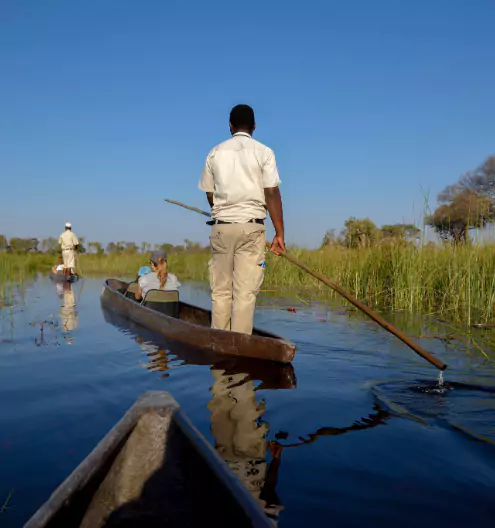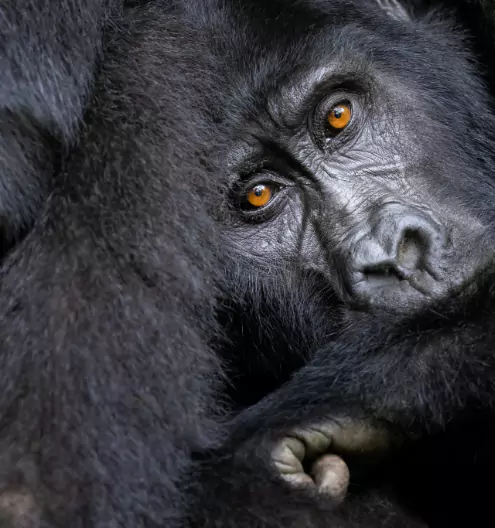Planning your first luxury safari? Discover the best safari in Africa for the first timers – Kenya, Tanzania, Botswana, when to go , packing tips and top lodges. Book with NndeeAfrika.
If you want the classic, high -probability wildlife experience with luxury lodges and easy logistic, Tanzania and Kenya are the most reliable choices. For quiet , ultra-private wildlife viewing, Botswana (Okavango Delta) is world-class. South Africa is ideal if you want to combine safari with cities and wine country, Uganda/Rwanda are excellent alternative if gorilla trekking is your dream.

Tanzania gives you a diversity, the plains of the Serengeti, the crater ecosystem of Ngorongoro and dramatic Great Migration ( Dec - March, June to October). If timing you first safari to see river crossing matter, Tanzania is a Top pick.

If your priority is privacy , small guest numbers and immerse wilderness (mokoro boast safaris), Botswana is often ranked among the very best safari experiences. The Okavango Delta's year-around water makes for exceptional wildlife density.

The Masai mara and Amboseli offer some of the Africa's most iconic wildlife viewing, combined with lodge catering to luxury travelers. Flight and transfers are straight forward, and guides are experienced at ensuring high-quality sightings.

For travelers who want optional self drive, luxury lodges and mix of city time (Cape Town) South Africa offers great flexibility and accessibility for first Safari.

Gorilla trekking is a once in a life time experience - quiet , more controlled and deeply emotional. Consider pairing a gorilla trek with other wildlife for a varied first trip.
Expect early mornings (sunrises drives), leisurely midday rest at your lodge, and late afternoon game drives. lodges handle logistics and meals, leaving you to enjoy wildlife , spa time or a private deck view. Guide briefs you each morning on where to go and what to look for – that local knowledge is the difference between seeing an animal and seeing an animal up close.
Travel with recommended vaccinations, keep insects precautions in mind, and always follow guides’Safety briefings. Luxury operators will include insurance option like am ref or medic option or Willa devise accordingly.
Africa is a home to a variety of natural wonders, including the Big 5 in Sabi Sands game reserve, Okavango Delta in Botswana, African wild dogs in Hwange National Park Zimbabwe, Gorilla trekking & golden monkey trekking in Volcanoes, Akagera national park in Rwanda, Maasai Mara National park in Kenya, Serengeti wildebeest great migration ,Ngorongoro Crater, Mountain Kilimanjaro trekking whilst in Tanzania and the Ultimate best Luxury safari lodges, hotels and Tented luxury mobile camps
Are you planning a trip to Africa? There is nothing quite like going across the continent. Traveling to Africa is bound to captivate your heart, from the fascinating civilizations to the abundant animals and beautiful scenery. Kindly review some of our Africa travel tips
Africa is a year-round destination for luxury safari travel, but the dry season is the best time for game-viewing.
For East Africa, the dry season is from July through October, while for
Southern Africa is a little longer:
April through October. Itineraries vary in length, distance covered, and focus, and each nndeeafrika Luxury Safari is amazing and puts you in touch with the true spirit of the region. If you have questions or aren’t sure which tour to choose, email at enquiries@nndeeafrika.com and we’ll help you customize the safari that’s right for you.
East and Southern Africa have wonderful weather and may be visited all year. Best time for an African Safari.
A pleasant 70 degrees Fahrenheit greets the day in Tanzania and Kenya – The weather usually changes throughout the year. Temperature varies more by geography than by season, with chilly upcountry places like Mount Kenya and the Aberdares at 7,000 feet, warmer dry bush country, and tropical sea level districts like Mombasa and Zanzibar.
Southern Africa has more visible seasonal variations, with winter lasting from April to November and summer lasting from December to March. Early mornings and nights on safari are generally colder than expected across Africa, particularly in May, June, July, and August.
Visas are required for entrance into Rwanda, Kenya, and Tanzania, however visas may be obtained on arrival in Zimbabwe and Zambia. Visas are not required for US passport holders to visit South Africa or Botswana.
Travel insurance is strongly recommended for African safaris, although it is entirely optional. We recommend that guests obtain a travel insurance coverage that covers their vacation, and we urge international guests to look into travel insurance companies.
The Great Migration in East Africa is heavily dependent on the weather, so it is best to talk to a Nndeeafrika Safari specialist regarding the best time to plan your trip. In general, the herds can be found amidst the short grasses of Serengeti National Park from November to May.
From January onward, wildebeest, zebra and Thompson’s gazelle alternate between the woodlands and plains depending on the weather.
In May, as the grasses become dry, the herds begin the roughly 500-mile Migration. They move north, and by June they are in the more lush plains of Kenya’s Maasai Mara.
In November and December, they arrive in intensely green savannas and woodlands where they stay until the cycle begins again.
Prior to departure for safari, Nndeeafrika requires all travelers on their safari programs to be fully vaccinated against Covid. However, immunizations are not always required. Before traveling abroad, it is always a good idea to carefully assess your health needs. The CDC advises using a malaria preventive and consulting the CDC instructions at https://www.cdc.gov/. We urge that you contact your doctor well in advance of your trip to discuss these options.
The title “Big Five” alludes to Africa’s top predators, the lion, leopard, elephant, rhinoceros, and Cape buffalo, which are must-sees on any safari experience in Tanzania, Kenya, South Africa and Botswana
We recommend booking your trip as soon as possible. Lodges and tented camps for safari are booked up quickly, so we need to reserve those before they fill up. However, sometimes we do have space at the last minute as well.

An African safari is a bucket-list adventure, offering breathtaking wildlife encounters and awe-inspiring landscapes. Whether you’re a first-timer or a seasoned traveler, these African safari tips will help you prepare for a safe, respectful, and unforgettable journey. When it comes to African safaris, these tips are essential.
Visit a travel clinic 6–8 weeks before departure for vaccines (yellow fever, typhoid, hepatitis A).
Carry a yellow fever certificate; some countries require it for entry.
Pack malaria prophylaxis if visiting risk zones and use DEET repellent.
Research visa requirements early. Countries like Kenya and Rwanda offer e-visas, while others require embassy applications.
Ensure your passport has 6+ months’ validity and blank pages.
Dry seasons (June–October) are ideal for safaris in East/Southern Africa.
Avoid heavy rains (March–May) to prevent road closures and limited wildlife access.
Explore our African Packing List for a detailed checklist.
Avoid flashing valuables; use hotel safes.
Book reputable guides for hikes or city tours (check reviews!).
Keep emergency numbers saved (e.g., local embassy, tour operator).
Learn basic greetings in local languages (e.g., “Jambo” in Swahili).
Always ask permission before photographing people.
Dress modestly in religious sites and rural areas.
Use local currencies for markets (USD/Euros accepted in tourist areas).
Bargain politely in street markets—start at 50% of the asking price.
Opt for overland tours or hostels to save on accommodation.
Support eco-lodges and community-run tours.
Avoid single-use plastics; refill water at filtered stations.
Africa’s diverse ecosystems offer unique experiences:
Compare destinations in our Best Safari Parks in Africa guide and explore African Destinations